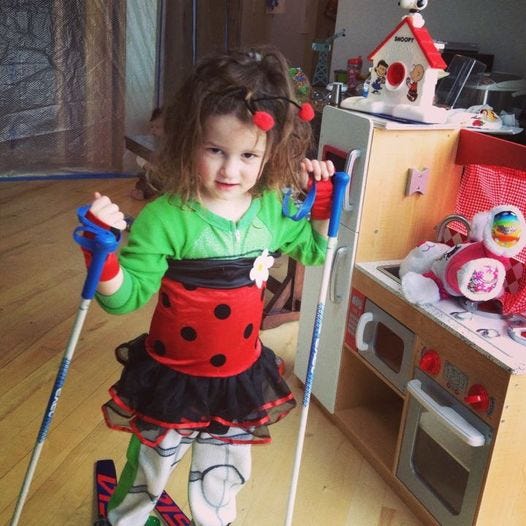On Loving and Accepting Each Other's Totally Weird Selves
This photo came up today on my Facebook memories:

11 years ago today. March 6, 2013. Maisa wore this Buzz Lightyear onesie for probably a year straight. When she was feeling sassy, she would put the Ladybug Girl costume on top. On this particular day, March 6, 2013, cross country skis were added. Her unique sense of style was always honored in our home. It was welcomed and celebrated at The Children’s School, her preschool.
When Maisa was about ten years old, we read The Confidence Code for Girls together. We read it out loud, one chapter at a time, stopping after each one for thoughtful discussions. I found the companion journal to the book in her room recently. In it she had written that she likes to be her “own totally weird self,” and feels confident.
When and where did she start receiving messages that it was not ok to be her own totally weird self? How did she lose that confidence? Did she learn at school that people should act or look the same? Did she watch groups of kids play and learn that she needed to be a certain way in order to fit in? Did she ultimately find that her totally weird self was, in reality, not included and accepted in the outside world?
I learned recently that the founder of ABA Therapy, which is widely accepted as the standard behavioral therapy for Autism and the only behavioral therapy approved by insurance, was also involved in the creation of gay conversion therapy. ABA Therapy essentially seeks to make autistic children appear not autistic. It teaches them that who they are is not ok; that they should ignore and abandon their true selves in favor of learning and adopting the behaviors performed by the majority of society. Even if it makes them sick. Even if it kills them. Why is this the standard practice? We, as a society, generally accept that gay conversion therapy is wrong and that people should be accepted for how they identify sexually. We should do the same with neurodiversity. Neurodiverse individuals should not be expected to conform to a neurotypical standard. It is harming children and increasing their risk of mental health issues, including self-harm, substance abuse and suicide.
I would encourage you to consider whether you have any internalized ideas that everyone should behave in a neurotypical way. Is it ok if someone can’t make eye contact with you during conversation? Prefers written communication over phone calls? Struggles with scents, lights or loud noises? Doesn’t want to shake hands or hug? Although neurotypical individuals like to promote the healing benefits of touch, for many neurodivergent people, touch can send the nervous system into a further state of dysregulation. Timing and consent is extremely important.
What if we were able to believe that another person’s experience is as they say it is, and not as we think it should be based on our own personal worldview?
I would love to see what Maisa might be wearing today, March 6, 2024, if she truly felt comfortable enough to still be her totally weird self and wear whatever she wanted. I think she would likely be wearing something that she made herself. It would be one of a kind, just like her. I hope that we can create a world where other children like Maisa can thrive and be accepted for who they are, not who the world thinks they should be.


I loved Maisa’s costumes combo of Buzz and Ladybug girl. She was truly unique and joyful at that age.
My Maisie who is the same age as Maisa wore 10+ pairs of underwear each day at that age and her sweatpants would bulge out over the layers and she would get marks around her legs from all the elastics. My daughter, her mom, would let her wear those and the All Day teachers would struggle with her to get them down every time she needed to go potty. No one made her feel bad about what she wore until she was ready to give wearing them up.
I think we cannot comprehend how different and difficult it is to grow up in the age of social media. I wish I had answers. The good news is that your dedication to lovingly talking about all these issues and whaat happened to Maisa will make a difference in this community. Continue to love others with all the love you have for Maisa and your family. Reach out to any of us who can help. You are loved. Betsy